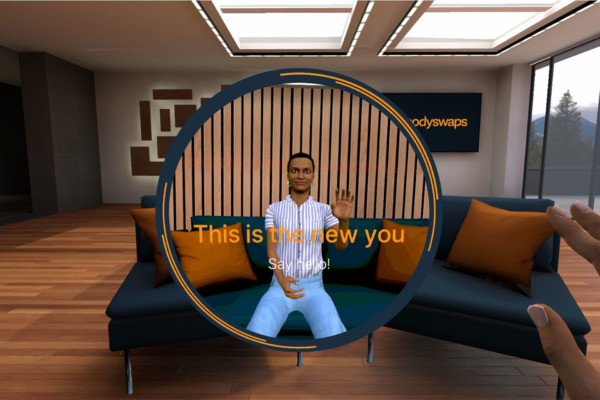Destiny and demographics
As the job market stagnates and employers create ever-dwindling numbers of entry-level jobs, young people face increasingly fierce competition for every available position.
All too often, demographics determine a young person’s destiny, with social background being a primary indicator of who will win the race for jobs. And with predictions that 28% of 16-24 year olds will have lost their jobs to automation by 2030, the situation looks set to get even worse.
But what if technology - the very thing that is threatening a high proportion of these entry-level positions - could be used to help young people to secure work? This article explores how virtual humans are doing just this by helping applicants to present their best selves in interviews.
Finding your best self
To perform well in an interview, it’s vital to understand how to present your best self. But our sense of self is fluid and shaped by interactions with others. As individuals, we learn to see ourselves the way we believe others see us. This leads to a self-fulfilling prophecy - a prediction that causes itself to become true.
Two theories of self-fulfilling prophecy that are significant to this discussion take their names from Greek mythology - the Pygmalion and Proteus effects.
The Pygmalion effect
In Greek mythology, Pygmalion was a sculptor who scorned all women. His masterpiece was a sculpture of Galatea, a woman more beautiful than any who had ever lived. Taking pity on him, Aphrodite, ‘God of Love’, gave life to the statue and they were married.
Inspired by the story, psychologists Rosenthal and Jacobson adopted the name to describe how we project our expectations onto others, creating a self-fulfilling prophecy.
Such influences are well documented in education, whereby a teacher’s expectations of their students has a strong effect on student performance. For example, one key finding of the Social Mobility and Child Poverty Commission’s review was how some teachers’ expectations of students from disadvantaged backgrounds act as a barrier to student success.
In a major international study, the OECD found that, even after accounting for differences in the socio-economic status of students and schools, students whose teachers had low expectations of them performed significantly worse.
The Pygmalion effect teaches us that students conform to reflected appraisals (their perception of how others see and evaluate them) not only from their teachers and parents, but also from their peers. This means that the gaps between ‘good prospect’ and ‘poor prospect’ students escalate from the classroom to the interview room.
To help young people navigate the interview process, most school and college careers services offer interview-skills training. High achieving students derive great benefit from practising their skills in mock interviews with peers and careers counsellors. But their lower-achieving peers continue to perform the lesser role expected of them.
Research suggests that virtual humans are less threatening during social interactions than their real counterparts, so it is likely that providing young people with the opportunity to practise job interviews in VR with virtual humans removes that weight of judgement they might otherwise feel when practising in real life, allowing them to try on a different role - that of the confident, accomplished job candidate.
The Proteus effect
Further support for this comes from another phenomenon known as the Proteus effect. In Greek mythology, Proteus, ‘God of the Seas’, had the ability to assume many forms.

Research has demonstrated that when people interact in virtual environments through an avatar, they tend to emulate the behaviours and attitudes that they associate with their avatar’s identity characteristics.
In virtual settings, individuals tend to feel a greater sense of anonymity, allowing them to fixate less on their self-perception and more on their perception of the characteristics of their avatar, which leads to attitudinal and behavioural changes which can persist after they leave the simulation.
For example, in one famous study, subjects whose avatars were given the ability to fly, like superheroes, exhibited an increase in helping behaviour, compared to subjects whose avatars rode in a helicopter. In other studies, avatar identity characteristics were shown to elicit a range of behaviours from negotiation aggressiveness, financial risk-taking and antisocial behaviour to dating and food choices and even maths performance and creative thinking.
Embodying aspiration
Clearly, the identity cues exhibited by the avatar’s appearance is of great significance here and bears further investigation with respect to which characteristics most strongly foster ‘accomplished job candidate’ perceptions.
![]()
A balance also needs to be struck between using avatars that help learners to set aside self-limiting beliefs and allowing sufficient psychological connection to allow them to experience a true sense of embodiment.
At Bodyswaps, we are already looking into how we can incorporate options to personalise avatars or even build or import your own digital self. But as we have seen here, it can be fun and even liberating to take on a different appearance, if only for a short while.
Bodyswaps’ Job Interview Simulator
The Job Interview Simulator uses Virtual Reality and Artificial Intelligence to guide learners through essential interview techniques. Through 4 modules, learners receive tailored guidance and personalised coaching on essential techniques like managing anxiety, connecting personal characteristics to the job description, and how to construct the perfect answer to practically any question, before attempting the ultimate interview simulation.
Find out more about the Job Interview Simulator and download a free demo here.






